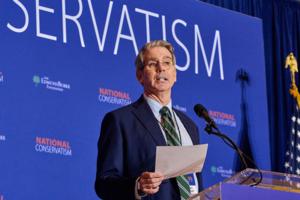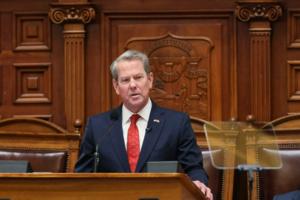Current News
/ArcaMax

Trump administration cancels dozens of international student visas at University of California, Stanford
LOS ANGELES — The Trump administration has canceled dozens of international student visas at California campuses, including UCLA, UC San Diego, UC Irvine, UC Berkeley and Stanford, university leaders, students and faculty at campuses confirmed to The Times.
At UCLA, the revocations hit at least eight international students, according to ...Read more

Anti-Trump, Musk protests kick off around the nation
LOS ANGELES — Tens of thousands of people took to the streets across the country on Saturday to protest President Donald Trump and a wide range of his administration’s actions, including government downsizing, attacks on the rights of immigrants and transgender people, and tariffs that are roiling economies across the globe.
More than 500,...Read more

Wall Street gets rude shock as Bessent plays second fiddle on tariffs
WASHINGTON — From the moment President Donald Trump unveiled his sweeping tariffs Wednesday through the ensuing market mayhem the following day, Treasury Secretary Scott Bessent’s phone lit up with text messages from executives tied to his former industry.
Multiple hedge fund managers and finance executives reached out, seeking his help in ...Read more

Colombia, US spar over Petro's approach to fighting drug cartels
Colombia said it’s acting “decisively” against transnational organized crime after a senior U.S. official described the country’s president as being sympathetic to drug traffickers and gang members.
Operations against the Tren de Aragua gang have “significantly weakened” its consolidation in Bogota and thwarted its expansion plans,...Read more
He sold investors on a new app, but spent the money on cars, his Malibu mansion and yacht, feds say
LOS ANGELES — A Malibu man has been convicted of fraudulently obtaining an estimated $25 million in investments in his tech company and using the funds to finance a lavish lifestyle that included a Rolls-Royce, mansion by Carbon Beach and yacht, authorities said.
After a nine-day trial, Bernhard Eugen Fritsch, 63, was found guilty of one ...Read more

American YouTuber arrested for bringing Diet Coke to isolated Indian island
An American YouTuber was arrested by Indian authorities after he allegedly snuck onto a remote island untouched by the modern world, bringing with him a coconut and a can of Diet Coke as an offering for an isolated tribe that lives there.
Mykhailo Viktorovych Polyakov is accused of using an inflatable boat to illegally travel to North Sentinel ...Read more
Miami-Dade SUV ambush leaves woman dead and 2 kids injured, deputies say
MIAMI — A woman and two children were ambushed and shot at by a group of people while they were sitting in an SUV early Saturday morning, deputies said. The group killed her and injured an 11-year-old and 12-year-old.
Around 1 a.m., the trio was sitting inside the dark-colored SUV in the area of Northeast 141 Street and Northeast Second Court...Read more
NYC's regional Head Start office shuttered as part of Trump's health cuts
NEW YORK — The federal Head Start outpost in New York City has been shuttered and staff laid off as part of the Trump administration’s recent health department cuts — worrying preschool leaders about the future of child care for families in poverty.
On Tuesday, providers learned that half of the agency’s regional offices were closed ...Read more

Yale police officer arrested on child pornography charges
A Yale police officer has been arrested for allegedly possessing dozens of digital files depicting child sexual abuse, state police said.
Otilio Green, 43, of Hamden, was arrested Friday following a Connecticut State Police investigation prompted by a tip sent to the National Center for Missing and Exploited Children, or NCMEC.
The tip ...Read more

What bills from Georgia's 2025 session will Gov. Kemp sign?
ATLANTA — This year’s legislative session ended with a jolt, as Senate leaders abruptly adjourned and left dozens of pending proposals to die on the vine.
But before the Friday standoff, Georgia lawmakers had already approved a stack of bills, setting the stage for Gov. Brian Kemp to begin the final phase of the legislative process. He has ...Read more

Marjorie Taylor Greene's ex-husband apologizes for harassing 3 Muslim women
The ex-husband of Rep. Marjorie Taylor Greene, R-Ga., has apologized for berating three Muslim women in Georgia days after a video of the incident went viral.
“I came today just to meet with the young ladies that I was mean to and treated disrespectfully about their religion and about what they were doing,” Perry Greene said Friday at a ...Read more

San Diego judge blocks Texas company from selling rebranded 'ghost gun' machine in California
SAN DIEGO — A San Diego Superior Court judge has issued a ruling that bars a Texas-based company from selling and marketing in California a computer-controlled milling machine designed to make untraceable “ghost guns,” with the decision marking the third significant victory for San Diego County in the early stages of its lawsuit against ...Read more

Canada warns residents their phones may be searched at US border
The Canadian government issued a new warning for travelers entering the U.S., saying they should “expect scrutiny” at the border and that their phones and other electronic devices may be searched.
The updated travel advisory follows U.S. President Donald Trump’s move to tighten border and immigration policy, which had already prompted ...Read more

5 nurses on same floor of Boston-area hospital develop brain tumors
Five nurses who worked on the same floor of a Boston-area hospital have all developed brain tumors.
In total, 11 members of the fifth-floor maternity unit at Mass General’s Newton-Wellesley Hospital have reported suffering from health issues, including the nurses diagnosed with the benign tumors. Two of those have the most common, benign ...Read more

Why is it raining so much in Kentucky? A rare rain-soaked 'conveyor belt' is crashing into a stingy front
LEXINGTON, Ky. — You’re not the only one asking this question: Why is it raining so darn much?
Some of Kentucky’s foremost and longest-tenured experts on weather and flooding aren’t sure when they last saw a system so sustained hang over the state.
From Thursday afternoon through Saturday, downpours have pelted much of the commonwealth...Read more

Anti-Trump, Musk protests kick off around the nation
LOS ANGELES — Tens of thousands of people took to the streets across the country on Saturday to protest President Trump and a wide range of his administration’s actions, including government downsizing, attacks on the rights of immigrants and transgender people, and tariffs that are roiling economies across the globe.
More than 500,000 ...Read more

Trump administration cancels more than a dozen international student visas at University of California, Stanford
LOS ANGELES — The Trump administration has canceled more than a dozen international student visas at California campuses, including UCLA, UC San Diego and Stanford, university leaders, students and faculty at campuses confirmed to The Times.
At UCLA, the revocations hit at least eight international students, according to faculty groups and ...Read more

LA Unified schools burned in Palisades fire hit milestone in their $600 million rebuild
LOS ANGELES — The $600 million effort to rebuild the three L.A. Unified schools burned in the Palisades fire has hit an important milestone ahead of schedule — all debris has been cleared from the properties, Superintendent Alberto Carvalho said Friday.
Calling the debris removal a "pivotal moment for all of us," he detailed rebuilding ...Read more
'There was blood everywhere.' Sectarian killings ravage Syrian villages
AL-SANOBAR, Syria — Mayada pointed to a divot picked out of the pavement in front of her parents' house — the hole left by the bullet when gunmen threw her 85-year-old father on the ground and shot him execution-style in the head.
"His skull was completely split … all in pieces," she said, her face impassive. Inside the house she found ...Read more

Netanyahu to meet Trump on Monday to talk tariffs, Gaza, Iran
Prime Minister Benjamin Netanyahu will meet on Monday with President Donald Trump in Washington to seek a better tariff deal for Israel and to discuss the war in Gaza, the situation in Syria and the Iranian nuclear program, an Israeli official said.
Netanyahu is in the Hungarian capital Budapest where he was warmly welcomed by Prime Minister ...Read more
Popular Stories
- Immigration crackdowns disrupt the caregiving industry. Families pay the price
- Florida AG targets State Attorney Monique Worrell after she unveils new policy for case backlog
- A Cuban exile needed a home. Now he's repaying the favor
- Alleged member of online 764 movement arrested for child sextortion in plot to accelerate world downfall
- Trump pulls back Biden's plan to cover weight loss drugs





